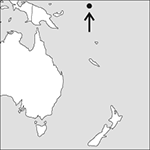
Source: MAPS IN MINUTES™ © RH Publications (1997)
Capital:
Yaren (de facto; there is no official capital)
Area:
21 sq km (8.2 sq miles)
Population:
9,434 (2013 est)
Currency:
1 Australian dollar = 100 cents
Religions:
Protestant 45.8%; Roman Catholic 33.2%
Ethnic Groups:
Nauruan 58.0%; other Pacific Islander 26.0%; Chinese 8.0%; European 8.0%
Languages:
Nauruan (official); English
International Organizations:
UN; Commonwealth; Pacific Islands Forum; Secretariat of the Pacific Community
A tiny island country just south of the Equator in the south-western Pacific Ocean, between longitudes 166° and 167° E.
Physical
Nauru is a coral island, with a band of fertile land around the coast rising to a central plateau.
Economy
Nauru’s wealth formerly lay in phosphate deposits. However, the supply of phosphates is almost exhausted and the trust funds into which phosphate revenues were paid have been dissipated. With 80% of the land rendered uninhabitable by phosphate extraction, Nauru faces grave economic problems and the economy and government are entirely dependent on Australian support.
History
Nauru was settled by various Polynesian peoples who travelled there from other islands before being discovered by the British in 1798. In 1899 a British company, the Pacific Islands Company based in Sydney, found that the island comprised the world’s richest deposits of phosphate of lime. The company began mining the deposits in 1906. From 1888 to 1914 the island was part of Germany’s Marshall Islands protectorate. Thereafter, apart from three years of Japanese occupation during World War II, Nauru was a trust territory of Britain, Australia, and New Zealand, before achieving independence and a limited membership of the Commonwealth in 1968. In 1993 Australia, Britain, and New Zealand agreed to pay compensation for the damage done to the island by mining. From 2001 to 2008 a major source of employment and income was a holding centre for refugees and asylum seekers attempting to enter Australia. The centre was reopened in 2012. The political culture is very unstable. Since 2013 the President has been Baron Waqa, who has cracked down on judicial and parliamentary opposition.
- disk array
- disk cache
- disk cartridge
- disk drive
- diskette
- disk format
- disk galaxy
- disk operating system
- disk pack
- disk population
- disk read-write head
- disk stack
- disk storage
- disk striping
- disk-to-plate
- disk unit
- dislocation
- dislocation creep
- dismicrite
- dismissal for cause
- disodium hydrogenphosphate(V)
- disodium orthophosphate
- disodium tetraborate-10-water
- d-isomer
- disordered solid